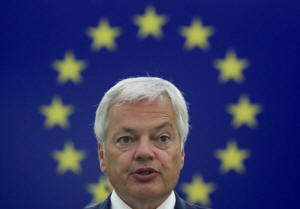EU has frozen 13.8 billion euros of Russian assets over Ukraine war,
official says
 Send a link to a friend
Send a link to a friend
 [July 12, 2022]
BRUSSELS (Reuters) - The European Union has
so far frozen 13.8 billion euros ($13.83 billion) worth of assets held
by Russian oligarchs, other individuals and entities sanctioned for
Moscow's war against Ukraine, the bloc's top justice official said on
Tuesday. [July 12, 2022]
BRUSSELS (Reuters) - The European Union has
so far frozen 13.8 billion euros ($13.83 billion) worth of assets held
by Russian oligarchs, other individuals and entities sanctioned for
Moscow's war against Ukraine, the bloc's top justice official said on
Tuesday.
The official said the vast majority of that comes from five of the EU's
27 member states only, calling on others to step up. The bloc currently
has 98 entities and nearly 1,160 individuals blacklisted for Russia's
role in Ukraine.
"For the moment, we have frozen funds coming from oligarchs and other
entities worth 13.8 billion euros, it's quite huge," EU Justice
Commissioner Didier Reynders said on Tuesday.
"But a very large part, more than 12 billion comes from five member
states so we need to continue to convince others to do the same," he
told reporters on arriving to a meeting of the national justice
ministers in the Czech capital Prague.
He did not identify the five countries.

He said he expected a final political agreement after the summer on a
new legal tool to make breaching or attempting to bypass sanctions a
criminal offence everywhere in the EU, which is not the case currently.
The policy, meant to curb circumventing restrictions
by transferring assets to family members who had not been sanctioned,
could then take effect in the autumn.
[to top of second column]
|

European Justice Commissioner Didier Reynders addresses the European
Parliament plenary session in Strasbourg, France September 15, 2021.
REUTERS/Yves Herman/Pool/File Photo

"If it's the case, the money will go back to a fund for Ukrainian
people, to give back the money to the Ukrainian people after the
confiscation of assets," he said.
Reynders and the ministers also discussed cooperating with Eurojust,
the bloc's agency for criminal justice, on building up evidence of
alleged war crimes in Ukraine, which had been attacked by Russia
from land, sea and air last February.
He said Eurojust would store all the evidence and should cooperate
closely with the bloc's member countries, 14 of which have their own
national investigations running into the war.
"The most important is to have a very good coordination, to not
duplicate the different situations, and to collect all the evidence
in the same place," said Reynders.
($1 = 0.9979 euros)
(Reporting by Gabriela Baczynska; Editing by Alison Williams)
[© 2022 Thomson Reuters. All rights
reserved.]
This material may not be published,
broadcast, rewritten or redistributed.
Thompson Reuters is solely responsible for this content.
 |